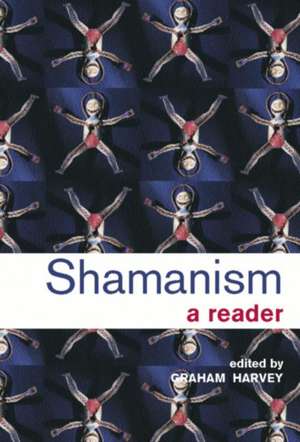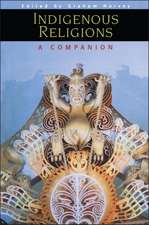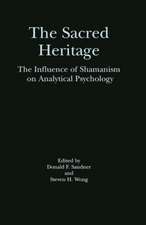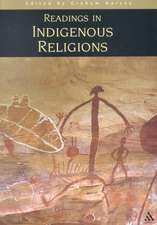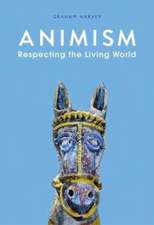Shamanism: A Reader
Editat de Graham Harveyen Limba Engleză Paperback – 3 oct 2002
| Toate formatele și edițiile | Preț | Express |
|---|---|---|
| Paperback (1) | 427.55 lei 6-8 săpt. | |
| Taylor & Francis – 3 oct 2002 | 427.55 lei 6-8 săpt. | |
| Hardback (1) | 1129.61 lei 6-8 săpt. | |
| Taylor & Francis – 3 oct 2002 | 1129.61 lei 6-8 săpt. |
Preț: 427.55 lei
Nou
81.83€ • 85.11$ • 68.58£
Carte tipărită la comandă
Livrare economică 13-27 martie
Specificații
ISBN-10: 0415253306
Pagini: 480
Ilustrații: 8
Dimensiuni: 156 x 234 x 26 mm
Greutate: 0.72 kg
Ediția:1
Editura: Taylor & Francis
Colecția Routledge
Locul publicării:Oxford, United Kingdom
Public țintă
UndergraduateCuprins
Introduction Part 1: Initiation Introduction to Initiation 1. How Sereptie Djarvoskin of the Nganasans (Tavgi Samoyeds) became a Shaman Sereptie Djarvoskin 2. Discovering the Way Michael Harner Part 2: Shamanising Introduction to Shamanising 3. Game and games, fortune and dualism in Siberian shamanism Roberte N. Hamayon 4. Possession and Public Morality Ioan M. Lewis 5. Ojibway shamanism John Grim 6. The New Anthropology of Dreaming Barbara Tedlock 7. Submitting Alan T. Campbell 8. The Reality of Spirits Edith Turner Part 3: Aestheics Introduction to Aesthetics 9. Like people in prehistory Thomas A. Dowson 10. The artistry and ritual aesthetics of urban Korean shamans Chungmoo Choi 11. Remembering to Forget Marina Roseman 12. Ethnographic Films on Shamanism Mihály Hoppál Part 4: Context Introduction to Context 13. Urgunge's Way Caroline Humphrey and Urgunge Onon 14. Rethinking Inuit Shamanism through the concept of "third gender" Bernard Saladin d'Anglure 15. Sacred Genders in Siberia Marjorie M. Balzer 16. Toughness and Tenderness in the Wild Man's Lair: The Everyday as Impenetrable, the Impenetrable as Everyday Michael Taussig 17. From cosmology to environmentalism as local knowledge on a global setting Piers Vitebsky Part 5: New Introduction to New 18. The Poetry of Shamanism Marjorie M. Balzer 19. Spiritual Hucksterism: the Rise of the Plastic Medicine Men Ward Churchill 20. Shamanism from Ecuador to Chicago: A Case Study in New Age Ritual Appropriation Paul C. Johnson 21. Tracking Lost Souls Sandra Ingerman 22. Dancing on the edge: Shamanism in Modern Britain Gordon MacLellan^n 23. The tree, the tower and the shaman: the material culture of resistance of the No M11 Link Roads Protest of Wanstead and Leytonstone Beverley Butler 24. Waking Ancestor Spirits: Neo-shamanic engagements with archaeology Robert Wallis 25. A Brief History of Psychadelics Terence McKenna Index
Notă biografică
Graham Harvey has written widely on paganism and indigenous religion, and is the author of Pagan Pathways (Harper Collins, 2001) and Paganism Today. He teaches at King Alfred's College, Winchester.
Recenzii
'A very interesting anthology of shamanic and neo-shamanic thought ... for anyone wanting to understand shamanism form a wider point of view ... it is an excellent and enjoyable read.' - Sacred Hoop
Textul de pe ultima copertă
Shamanism has been practised amongst communities all over the world for millennia, and continues to survive today in both modern and ancient forms. Shamanism: A Reader unites perspectives from disciplines including anthropology, psychology, musicology, and botany to provide an unique overview of modern writing on shamanism. Juxtaposing the traditional practices of indigenous peoples with their new and often radically urban reinterpretations, experts including Michael Harner, Milhàly Hoppàl, Majorie M Balzer and Piers Vitebsky raise questions about constructions of shamanism, its efficacy, its use and misuse as a cultural symbol, and its real nature.
Locating its material in the encounter between traditional and contemporary, and within many forms of response to the image of the shaman, Shamanism: A Reader is an essential tribute to the vitality and breadth of shamanic tradition both among its original practitioners of Europe, tribes of America and Asia, and within seemingly familiar aspects of the modern west. Representing the best of classic and current scholarship, and highlighting the diversity of approaches to shamanism in an accessible and user-friendly way, this clearly introduced and organized collection sets a new standard for shamanic study in terms of the breadth and depth of its coverage.
Descriere
Shamanism has been practised amongst communities all over the world for millennia; as one of the world's most universal and enduring spiritual traditions, it continues to survive today in both modern and ancient forms. During its long evolution from Siberia, Aboriginal Australia, Northern Europe and South America to the New Age movement and household television screen, it has provoked and enthused critics across the academic disciplines. The book gathers together perspectives from anthropology, psychology, musicology, botany and other disciplines to provide a unique overview of modern writing on shamanism. Juxtaposing ethnographic case-studies with descriptive surmises, and the ancient practices of indigenous tribes-people with new and often radically urban forms of shamanic interpretation, its cutting-edge selection highlights the diversity of approaches to shamanism in a thematic way. From grassroots political writing to established anthropological classics, the articles presented here cover topics including gender, initiation, hallucinogenic consciousness and political protest, whilst raising questions about constructions of shamanism,
